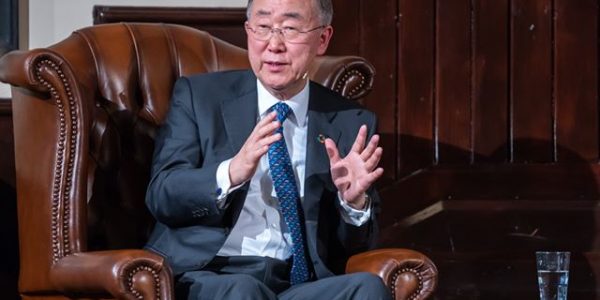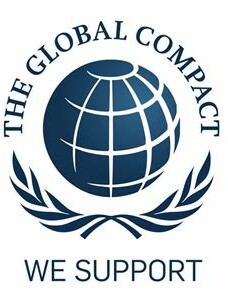The Ban Ki-moon Centre for Global Citizens Co-chair Ban Ki-moon was interviewed by Die Furche for its January Edition about the impact the United Nations had during his upbringing in Korea, his time as United Nations Secretary-General, his expectations for President-Elect Joe Biden, and how the 17 Sustainable Development Goals, Paris Climate Agreement and Global Citizenship are the road maps to achieve a better future for all.
Read the full English version below.
Access the full German Version here:
“We need more Global Citizens”
Die Furche, 7 January 2021
1. Former UN Secretary General, may I start with a personal question: You come from a country that has been divided by war to this day – how did that shape you for your later role as the world’s top peacemaker and peacekeeper?
When I was born before the end of the Second World War, everybody was poor. Soon after, South Korea was attacked by North Korea. At that time, the United Nations had sent troops and humanitarian aid. As a child growing up during the Korean War my family received food ratios and I studied with either kerosene lamps or with candlelight from schoolbooks that were provided by UNESCO. These are my first memories of the UN. Later it was the United Nations’ efforts that substantially helped rebuild and recover South Korea from the Korean War. Observing the incredible impact of the UN in supporting a divided country and assisting on the road to peace and prosperity has influenced me in my various roles. On many occasions, I have emphasized the importance of multilateralism in peacekeeping and I still believe in the role of the United Nations and the other global players in steering the peace between North and South Korea.
In the first months of this year, while the number of individuals infected by the virus and death tolls rose sharply, many trivialized Covid-19 by comparing it to the annual wave of influenza. On the other hand, others over-dramatized the situation and overstated the actual number of victims. Slowly, a more realistic picture has emerged.
2. 75 years after the end of the Second World War, 75 years after the founding of the United Nations, with the aim of “saving future generations from the scourge of war”, it looks in many places as if politicians and peoples have become “tired of peace”. Do you share this impression and how can the willingness to work for peace be rekindled?
Yes – in 2020 the UN was celebrating its 75th anniversary. It has been a great privilege for me to serve as Secretary-General of the United Nations for two terms. My motto was that I will make this “most impossible job”, as the first UNSG Trygvie Lie said, into a “possible mission.” I have been trying this during my ten years tenure, devoting all my time, passion and energy.
But frankly speaking we need to have much more sense of unity and collaboration amongst states of the world, much more global solidarity and compassion. The unanimous adoption of the 2030 Agenda by the 193 UN member states and the Paris Climate Agreement in 2015 were steps in the right direction. This still gives me hope. The Sustainable Development Goals provide a clear path towards creating equal, prosperous, and peaceful societies around the globe. By pledging to implement the global goals by 2030, governments, businesses, civil society, and academia are showing their will to join forces in the fight against poverty, hunger, inequality, corruption, human rights abuses and climate change to achieve a peaceful world.
This is therefore not the time to be “tired of peace”, on the contrary, it is the time to recommit to the UN Charter and Universal Declaration of Human Rights, the SDGs and the Paris Climate Agreement for our future generations.
3. In a CNBC interview, you were unusually harshly on trial with today’s generation of politicians. You said: “I do not have much expectation on current global leaders – they are all aiming for short time political gains – this is shameful.” Why is that so? How can we as society counteract this? Or is the saying true: people get the politicians they deserve?
Solidarity, empathy, and cooperation are the foundations on which societies can thrive. Especially in times of crisis, global leaders must portray these values and work together in the common interest of all humanity. However, today we see global leaders who have lost their focus and who do not base their policies on inclusive human rights. We see leaders who are favouring personal interest and profit over the well-being and safety of their own people.
To counteract destructive, exploitative, and unsustainable policies we need to empower a generation of politicians who are passionate and compassionate global citizens and who are living up to leaving no one behind. We can only create these leaders by fostering Global Citizenship Education and by promoting knowledge about the Sustainable Development Goals. The global citizenship mindset encompasses global citizen values, knowledge about the sustainable development goals and their implementation and 21st century skills.
4. In 1962 you took a trip to Washington, D.C. for an English competition. A meeting with US President John F. Kennedy during this trip led you, according to your biography, to become a diplomat. Almost 60 years later: Do you think the incoming US President Biden could also motivate young people to stand up for diplomacy and cooperation worldwide?
I will always cherish the memory of this trip to the US as a young man, meeting JFK. It was a turning point in my life. I do believe the new President-elect of the US, Joe Biden will also be an inspiration to a lot of young people around the world. Not only will he motivate youth to stand up for inclusive policies and international cooperation but once President-elect Joe Biden renews America’s commitment to Paris Climate Agreement, he also has a unique role to turn climate ambition into global climate action for the new generation. Also, by joining forces with Kamala Harris as the first female Vice President-elect, he has set an example for inclusive policies and that anything is possible. Despite facing so many challenges at the start of their term, I believe they can inspire next generations, influence their ambition and commitment to make this a better future for all.
5. And beyond that – what do you expect from President Biden and his administration for international cooperation in general and for the United Nations in particular?
The promise of President-elect Joe Biden to re-join the Paris Climate Agreement, as he takes office on 20 January 2021, will hopefully not only restore faith in the United States as an international team player, but will also strengthen cooperation with the United Nations. Not abandoning a commitment made 5 years ago and valuing fundamental rights and freedoms in their international leadership role, will result in the revival of the importance of the US in multilateralism, striving towards global solutions for global challenges.
6. In 2021 we hope to get the health effects of the Covid-19 pandemic under control with vaccinations – what lessons should the global community learn from Corona, in particular for global solidarity and cooperation?
The Covid-19 pandemic hit the global community unexpectedly hard. The pandemic exacerbated existing challenges such as climate change, humanitarian crises, widening disparity and strengthening authoritarian regimes. The tasks we are now facing are enormous, but not impossible to achieve if we work together and act in solidarity. The key notions that matter during and after the pandemic are cooperation, solidarity, responsibility, discipline, and compassion for the most vulnerable. The global situation also requires a strong commitment by all stakeholders to the Agenda 2030 and the UN Sustainable Development Goals. Covid-19 sheds light on the many profound inequalities that persist on our planet. Therefore, the verbal and theoretical commitments to solidarity must also be reflected in concrete actions supporting vulnerable groups such as refugees, migrants and racial minorities.
It is up to us to chart the right course for a better future for all. The pandemic showed us that we all have a responsibility as global citizens to stay vigilant. If the global community can show courage and empathic leadership today, we will all benefit from it by being equipped with tools to tackle equally grave challenges tomorrow.
7. I started with a personal question. May I end the conversation with another one: How was the feeling when you were no longer UN Secretary-General on the first day and the pressure was gone: Pride? Disappointment? Relief?
Whatever successes or achievements there may be associated to my tenure, they are the outcome of joint efforts – not by me alone. The Secretary-General, however capable or willing, cannot achieve anything alone. No single country or person can do it alone without support. In that regard, I am deeply grateful to UN´s dedicated staff an all the partners around the globe, who have been working day and night – in many cases, in very dangerous circumstances. Without their hard work, we would not have achieved the Paris Agreement on climate change, we would not have had the 2030 Agenda for Sustainable Development. Both compounds serve as blueprints for humankind efforts towards the path to peace, prosperity and to building sustainable societies, a greener economy, and empowering the most vulnerable, leaving no one behind.
During my ten years serving as Secretary-General of the United Nations, I was always guided by four principals: setting priorities, never giving up, focusing on the people, and standing up for those who are left behind. No longer the Secretary-General, I am still guided by these principals. I continue my work by advocating the mindset of global citizenship and the importance of multilateralism.

